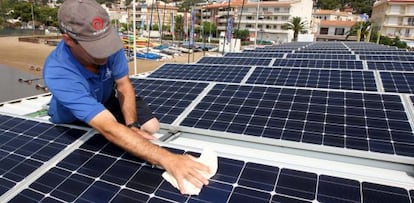Top court sides with government over decree cutting renewable subsidies
Popular Party administration faced slew of lawsuits over royal decree changing conditions

The Constitutional Court has sided with the Spanish government over its decision to introduce cuts to renewable energy subsidies, which were approved via fast-track measures in a bid to deal with a crisis in the Spanish energy sector.
In its sentence handed down on December 17, the Constitutional Court dismissed arguments by the Murcia regional government, which was challenging parts of the 2013 government legislation, which adopted urgent measures to guarantee the financial stability of Spain’s power industry.
International investors, meanwhile, sought protection via a number of different international arbitration bodies
The changes, which were rushed through parliament by royal decree, saw modifications of the conditions for investments in renewable energies that had already been made. The move prompted a flood of legal action by disgruntled firms. International investors, meanwhile, sought protection via a number of different international arbitration bodies.
Among its arguments, the Murcia government had questioned whether such changes could be made by royal decree or had to be passed by law. But the court said that there was “an extraordinary and urgent need” for the Popular Party (PP) government to pass the measure in the way it did.
The court also said that it didn’t believe that Spain was violating any of the European energy charters to which the central government in Madrid is a signatory.
Industry Minister José Manuel Soria had explained in Congress that the government was introducing the measures “to stop the unexpected rise in a deficit over rates” during the economic crisis. The deficit was caused by the difference between the sum paid by electricity companies to power companies and the amount they collect from customers.
Soria had argued that there was a drop for demand for electricity during the crisis while at the same time there was a general increase in the costs to utility companies.
Last year, the government also began studying whether to tax homes that produce their own energy through solar or wind power, rather than incentivizing them to do so.
English version by Martin Delfín.
Tu suscripción se está usando en otro dispositivo
¿Quieres añadir otro usuario a tu suscripción?
Si continúas leyendo en este dispositivo, no se podrá leer en el otro.
FlechaTu suscripción se está usando en otro dispositivo y solo puedes acceder a EL PAÍS desde un dispositivo a la vez.
Si quieres compartir tu cuenta, cambia tu suscripción a la modalidad Premium, así podrás añadir otro usuario. Cada uno accederá con su propia cuenta de email, lo que os permitirá personalizar vuestra experiencia en EL PAÍS.
¿Tienes una suscripción de empresa? Accede aquí para contratar más cuentas.
En el caso de no saber quién está usando tu cuenta, te recomendamos cambiar tu contraseña aquí.
Si decides continuar compartiendo tu cuenta, este mensaje se mostrará en tu dispositivo y en el de la otra persona que está usando tu cuenta de forma indefinida, afectando a tu experiencia de lectura. Puedes consultar aquí los términos y condiciones de la suscripción digital.








































